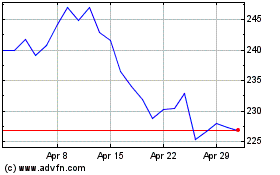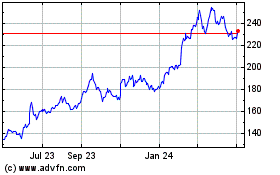Frenchman Gets Top Toyota Pay -- WSJ
June 26 2018 - 3:02AM
Dow Jones News
By Sean McLain
This article is being republished as part of our daily
reproduction of WSJ.com articles that also appeared in the U.S.
print edition of The Wall Street Journal (June 26, 2018).
TOKYO -- Toyota Motor Corp.'s highest-paid executive got a pay
increase of millions of dollars, and he now makes nearly three
times as much as his boss.
In an illustration of Japan's unusually low chief executive
officer pay -- and the exceptions companies make for non-Japanese
executives -- Toyota said that Frenchman Didier Leroy, its chief
competitive officer, earned more than Yen1 billion, or about $9.4
million, in the year ended March 2018, representing a 50%
raise.
That is a record pay package for the auto maker and nearly
triple the roughly $3.5 million earned by the next-highest-paid
Toyota employee, President Akio Toyoda, the company's head.
A key reason for the gap is Mr. Leroy's nationality. Toyota said
it offers pay that is "competitive," taking into consideration "the
remuneration standards of each country and region."
The other reason, according to Toyota, is Mr. Leroy's broad job
description, which gives him responsibility for the company's
planning, sales and manufacturing operations around the globe.
The Frenchman, who previously worked for Renault SA, is one of
seven Toyota executives -- and the only foreigner -- dubbed "the
seven samurai" by Mr. Toyoda and placed in charge of transforming
the company.
Mr. Toyoda wants to bolster profitability from the company's
main business of selling cars while investing in electric and
self-driving car research. The company has plowed billions of
dollars into those efforts, and it is Mr. Leroy's job to ensure the
rest of the business is healthy enough to support that.
Toyota's revenue rose 6% in the year ended March 2018 and net
profit rose 36% to nearly Yen2.5 trillion ($22.73 billion), aided
by U.S. tax-law changes.
Still, some experts were scratching their heads as to why a
French executive was earning so much more than his Japanese
peers.
"It's three times the president," said Tokyo-based auto analyst
Takaki Nakanishi, in reference to Mr. Toyoda. "I don't see any
strong reason why."
Mr. Leroy's salary places him in the same range as Nissan Motor
Co. Chairman Carlos Ghosn, who earned more than Yen1 billion in the
year ended March 2017, the most recent figures available. Mr. Ghosn
also earns money from executive positions at Renault SA and
Mitsubishi Motors Corp.
Mr. Leroy's pay package isn't out of line with what he might
expect to earn at a similarly sized car company elsewhere in the
world. It puts Mr. Leroy roughly in the range of General Motors Co.
President Dan Ammann, who manages that company's operations around
the world.
Japanese companies are known for their relatively low executive
compensation. Last year, American CEOs earned on average close to
$12 million a year, four times what the Toyota chief earned, even
though the car maker is Japan's largest company by market
capitalization and one of the biggest car makers in the world.
One reason for the pay gap is Japan's system of lifetime
employment at large companies. Most big companies choose CEOs from
their own ranks, and the CEO is typically someone who has worked at
the company for more than 25 years. Managers gain greater job
security in exchange for the knowledge that they won't make as much
as American peers if they reach the top.
Japan's system has long created some awkward pay gaps when its
companies go abroad looking for talent and when they send Japanese
executives to the U.S. to work alongside higher-paid
colleagues.
The U.S. bank now known as MUFG Union Bank, controlled by
Tokyo-based Mitsubishi UFJ Financial Group Inc., used to be
separately listed in the U.S. before the Tokyo parent took full
control. Its final proxy statement before delisting, published in
2008, showed that the Japanese CEO of the U.S. bank earned
$523,722, while the chief financial officer earned more than $2
million.
Nicholas Benes, who helped write Japan's corporate-governance
code and is co-head of the Board Director Training Institute of
Japan, said Toyota might take a closer look at whether its
high-performing Japanese executives are getting what they
deserve.
"I don't feel like condemning the value" of Mr. Leroy's pay,
said Mr. Benes. "It suggests that they're paying their domestic
guys too little."
Write to Sean McLain at sean.mclain@wsj.com
(END) Dow Jones Newswires
June 26, 2018 02:47 ET (06:47 GMT)
Copyright (c) 2018 Dow Jones & Company, Inc.
Toyota Motor (NYSE:TM)
Historical Stock Chart
From Jun 2024 to Jul 2024

Toyota Motor (NYSE:TM)
Historical Stock Chart
From Jul 2023 to Jul 2024
